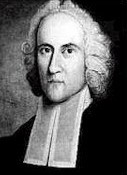| Great
Awakening preacher, New England theologian, and advocate of "experimental
religion." |
 |
|
Jonathan
Edwards
|
In 1735 Edwards
preached repentance to his Congregational church at Northampton, Massachusetts.
There were many conversions, and religious fervor spread to neighboring
towns. This early phase of the Great
Awakening was extended by George Whitefield.
Edwards wrote to defend the Awakening against hostile critics, but he
also subjected religious experience to careful scrutiny and evaluation.
These writings influenced John Wesley and many
others. Edwards held to the theological tradition of Calvin,
including original sin and divine election. True to his heritage of Puritanism,
Edwards saw conversion as the entry point into the Christian life and
the visible mark of sainthood. Meanwhile Edwards agreed with John
Locke that all knowledge is based on experience. For Edwards "experimental
religion" meant that religion must be known firsthand, just as one must
taste honey before one can "know" what honey is. Edwards resigned from
his congregation in 1750, in a dispute over whether or not a person must
be converted before receiving Holy Communion. Edwards continued writing
theological treatises on sin and free will, virtue, and God's purpose
in creating the world. In 1757 he became president of the College of New
Jersey, later named Princeton, but he died shortly thereafter.
|